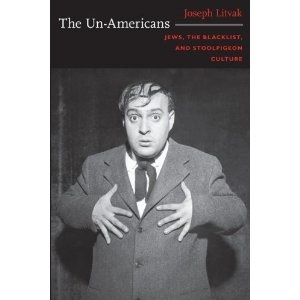Litvak ’76 Takes a Fresh Look at the Hollywood Blacklist and McCarthy Era
 In The Un-Americans: Jews, the Blacklist, and Stoolpigeon Culture (Duke University Press) Joseph Litvak ’76 offers a rethinking of the Hollywood blacklist and McCarthyite America by uncovering a political regime that did not come to an end with the 1950s or even with the Cold War, in which the good citizen is an informer, ready to denounce anyone who will not play the part of the earnest, patriotic American.
In The Un-Americans: Jews, the Blacklist, and Stoolpigeon Culture (Duke University Press) Joseph Litvak ’76 offers a rethinking of the Hollywood blacklist and McCarthyite America by uncovering a political regime that did not come to an end with the 1950s or even with the Cold War, in which the good citizen is an informer, ready to denounce anyone who will not play the part of the earnest, patriotic American.
Litvak draws on the work of Theodor W. Adorno, Hannah Arendt, Alain Badiou, and Max Horkheimer to show how the House Un-American Activities Committee (HUAC) conflated Jewishness with what he calls “comic cosmopolitanism,” an intolerably seductive happiness, centered in Hollywood and New York, in show business, and intellectual circles. He suggests that HUAC took the comic irreverence of the “uncooperative” witnesses as a crime against an American identity based on self-repudiation and the willingness to “name names.”
Litvak traces the outlines of comic cosmopolitanism in a series of performances in film and theater and before HUAC, performances by Jewish artists and intellectuals such as actors Zero Mostel and Judy Holliday, and screenwriter Abraham Polonsky. By analyzing the creative work of informers Broadway director and choreographer Jerome Robbins, film director Elia Kazan, and screenwriter/novelist Budd Schulberg, the author reveals the triumph of a “stoolpigeon culture” that still thrives in the America of the early 21st century.
Litvak is a professor of English at Tufts University.

